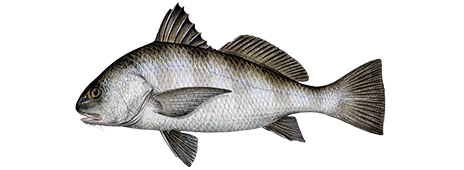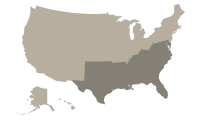
Black Drum
Drums use their air bladder to create a sound similar to a drum beating.

Region
South
Catch ease
Medium
Habitat
Bay, Ocean
How to identify a Black Drum
Drums are members of the croaker family which are comprised of 260 species including the weakfish, spotted seatrout, white seabass, Atlantic croaker, and California kingfish. The black drum is distinguished from similar species by the unusually large spine in the anal fin and numerous barbels on the chin. There are large pavement like teeth in the throat that are used to crush shellfish. Unlike the red drum, the black drum has no dark spot on the tail base. Juveniles have 4 or 5 broad, dark vertical bars on the body. They feed on mollusks and crustaceans that they locate in the sand with their sensitive chin barbels.
Where to catch Black Drum
The black drum is found in the western Atlantic Ocean from Nova Scotia to northern Mexico, including southern Florida, then from southern Brazil to Argentina. An inshore, schooling fish, the black drum is known to inhabit areas near breakwaters, jetties, bridge and pier pilings, clam and oyster beds, channels, estuaries, bays, high marsh areas, and the shorelines over sandy bottoms. The following list includes additional details on where to catch this fish:
| Backflow |
| Bays and Estuaries |
| Jetties and Breakwaters |
| Night Fishing |
| Ripples, Currents, Swirls and Sprays |
| Drop-Offs |
| Current Edges |
| Bays |
| Channel Entrances |
| Man-Made Structures |
| Reefs, Wrecks, and Shoals |
| Saltwater and Tides |
| Eddies |
How to catch Black Drum
The black drum is sluggish and does not strike quickly or with force, but when hooked, it puts up an exceedingly tough fight. Fishing methods include bottom fishing, casting from boats or shore, or slow trolling. Baits and lures include shrimp, clams, crabs, squid, cut fish, metal jigs, spoons, and weighted bucktails. Small drums of about 10-15 lb. (5-7 kg) are said to be good eating, though they are often infested with parasites. The following are fishing methods used to catch this fish:
Black Drum lures, tackle & bait
The following are lures, tackle or bait that can be used to catch this fish:
